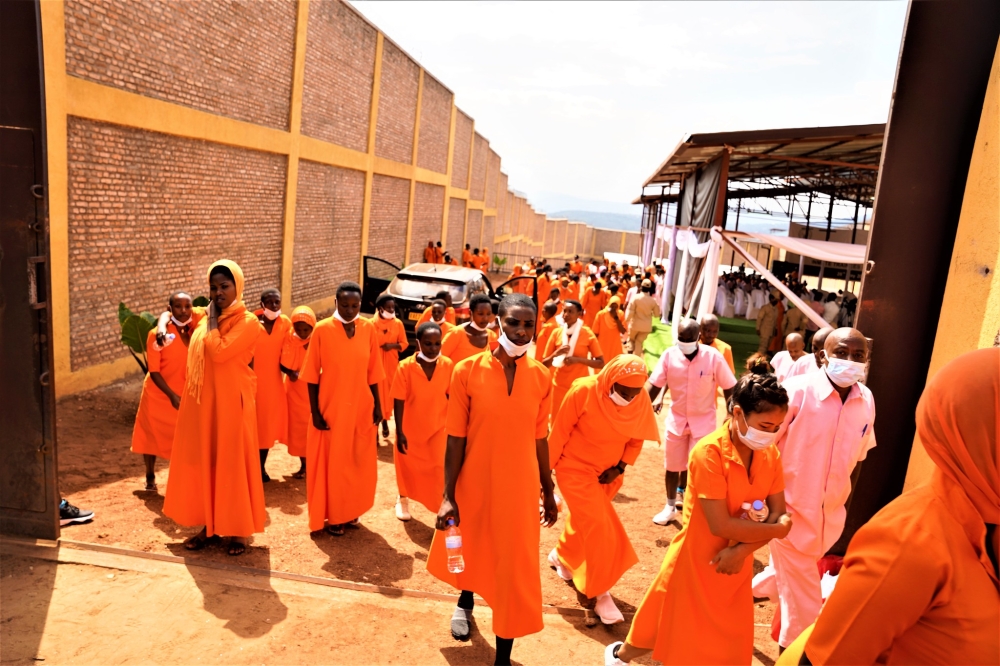

Psychological rehabilitation and reintegration of prisoners, particularly those convicted of the most heinous atrocities – crimes related to the Genocide against the Tutsi - is a crucial necessity in Rwanda.
Over the few coming years, approximately 20,000 people, including those who were the masterminds of the Genocide, are expected to be released. For survivors, the release of genocidaires leads to anxiety and fear of co-existence and daily interactions.
On the other hand, ex-prisoners often experience the fear of being confronted by the families of the victims or face rejection by the community.
Failure to ensure effective psychological rehabilitation and to provide psychosocial support to released prisoners or those nearing release is likely to threaten gains achieved in social cohesion and reconciliation 30 years after the Genocide against the Tutsi. Its success lays a solid foundation for a more resilient Rwandan society.
On 29 February and 8 April 2024, I had a privilege to attend two extraordinary events in Nyamasheke and Bugesera districts respectively, which evidence the importance of that approach.
In Nyamasheke, 19 female genocide prisoners nearing the end of their sentences returned to the community where they committed genocide crimes to seek forgiveness from their victims’ families.
They all went through Sociotherapy healing spaces that were established in Nyamagabe Correctional Facility by Interpeace together with its local partners - Dignity in Detention, Prison Fellowship Rwanda, Haguruka and Rwanda Correctional Service (RCS) as part of the Societal Healing program titled:” Reinforcing community capacity for social cohesion through societal trauma healing.”
The healing spaces equip prisoners with life skills and enable them to cope with mental distress stemming from the atrocities they committed and the life in prison. After completing the process, the 19 women prisoners felt remorseful and voluntarily asked to be linked with the families they offended to ask for forgiveness in public.
One by one, they came up to recount their crimes in front of genocide survivors, their own family members, local authorities, and other community members who witnessed that unique event.
Their crimes range from bringing stones that were used to kill the Tutsis, luring victims to their homes under the guise of protection only to be killed and dumping dead bodies in mass graves.
These perpetrators took accountability for their actions and humbled themselves before community members. The families of the victims accepted their apology without resentment.
Going through Sociotherapy was a crucial step as it played a catalytic role in their mindset shift from criminals to new people who accept to take responsibility for their acts and feel ready to live with others in society.
In Bugesera, where the "Societal Healing Programme” was piloted, it serves as a successful example of the process of reintegration. Graduates of Sociotherapy and other community-based approaches such as Resilience-oriented therapy and Multifamily therapy (family-focused therapy) healing spaces shared their journey to healing, forgiveness, and reconciliation.
In those spaces, Genocide survivors, Genocide perpetrators and their descendants come together to engage in weekly healing dialogues, which stimulate mutual healing, reestablish trust and forgiveness as well as foster reconciliation.
Much as it may be hard to understand how one can forgive such inhumane acts, there is evidence in the communities that those who avidly avoided one another despite being neighbours, have now become friends and good neighbours after going through this programme.
It provided a conducive environment for perpetrators to confront their actions and seek forgiveness.
Group-based approaches like multifamily therapy promote individual and collective healing. Through the healing dialogues, walls of hatred and division are dismantled, paving the way for a more united and resilient society.
As Rwanda continues to navigate the complexities of rebuilding the social fabric and strengthen resilience, ensuring effective prisoner rehabilitation and reentry into society is one of key ingredients.
To achieve this, all development and societal healing actors, including international organisations and donors, Civil Society Organisations as well as government institutions need to partner around the following:
-
Increase investment to scale up contextualized and evidence-informed and group-based healing approaches such as resilience-oriented therapy to reach all 13 correctional facilities across the country and extend the services to all categories of inmates.
-
Establish and scale up psychosocial support care system using approaches like multifamily, resilience-oriented therapy and collaborative livelihoods mentorships to more community members across all 30 districts of Rwanda; so they are ready to receive and live in harmony with those genocide perpetrators being released.
-
Ensure effective sector coordination to avoid duplication of interventions and scattering resources.
-
Strengthen the capacity of Rwanda Correctional Service (RCS) staff to better deliver on inmates’ psychosocial rehabilitation, including the implementation of a standardized curriculum recently adopted.
The writer is the Country Representative of Interpeace in Rwanda.


